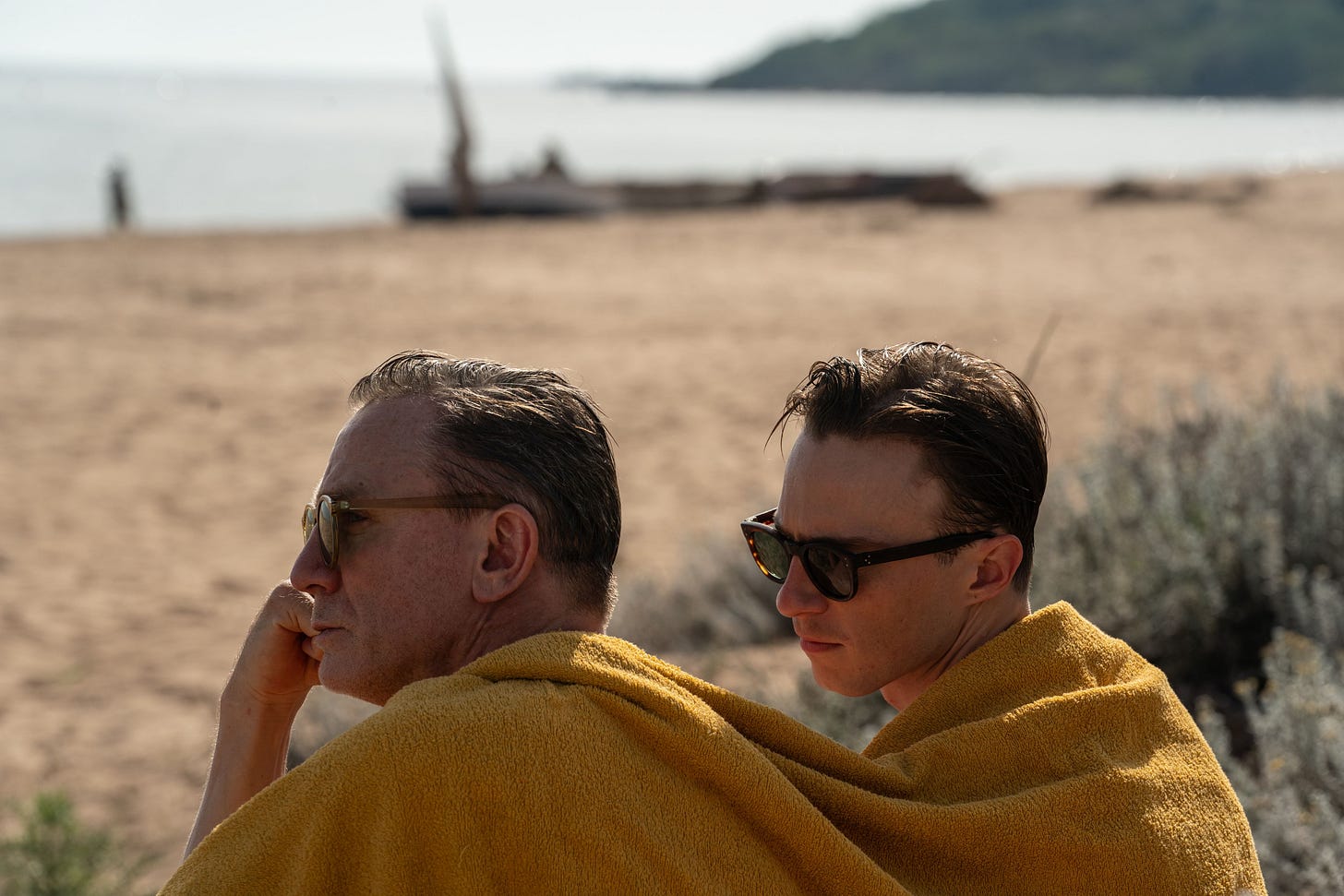Queer
A lonely trip through William S. Burrough’s consciousness.
We first see William Lee (Daniel Craig) the same way we might imagine William S. Burroughs in Mexico City in the 1950s, cigarette drooping from his lower lip, huddled on a barstool against loneliness and self-loathing. His apartment is full of books and typewriters and not much else. The entire movie is achingly lonely; in his performance, Craig wears the emotion like it’s an open wound.
Lee is an American expat, his life drifting parallel to—but not quite touching—the lives of an enclave of other queer men in the city. It’s obvious to us and to everyone else around him that Lee is desperate for human connection, though he might not be consciously aware of his own need. He lurches from bar to bar, drinking tequila like it’s water, helpless against any younger men who might be interested. When one named Eugene Allerton (Drew Starkey) looks his way, Lee falls hard.
Luca Guadagnino brings a lush decadence to the film that’s consistent to his previous work, slowing the pace to revel in Lee’s feelings of infatuation and loneliness alike. When Lee and Allerton first encounter each other, it’s on the street, on opposite sides of a rooster fight. All other sounds slip away to the strains of Nirvana’s “Come As You Are,” and the camera slides across Allerton’s cheekbones in a way that recalls the shot of Armie Hammer dancing to the Psychedelic Furs in Call Me By Your Name.
Cinematographer Sayombhu Mukdeeprom employs some of the tricks he used in Challengers, to similar effect. When Lee slides a shot of mezcal across the table to someone else, Mukdeeprom slides the camera along with the drink, as though the mezcal is a ball in a tennis match. In Challengers, tennis served as an intermediary between people, and in its purest form it becomes a complete relationship. In Queer, alcohol and drugs are the intermediary of choice: an avenue to get to know someone, or else a stopgap between a lonely person and the emptiness they feel with the absence of anyone else to share the world with.
Lee is a heroin addict; he moved to Mexico to avoid the consequences of the American legal system. Queer neither excuses nor apologizes for Lee’s life or behavior. The film doesn’t judge him for his orientation or his addiction; it’s more character study than explanation. Lee convinces Allerton to join him on a trip to South America to find ayahuasca, a drug he has read about in a magazine article speculating that the Soviets, and maybe also the CIA, are using it for experiments on telepathy. When Craig talks about the possibility of telepathy, he becomes almost boyish in his enthusiasm. Telepathy offers the chance to learn what others might think of him, to confirm that they approve of and love him. Simply engaging in a love affair isn’t working for him; Allerton is aloof and the relationship one-sided, a dynamic that underlines the aching need that motivates Lee.
Guadagnino uses sex scenes as a way to underline Lee’s loneliness and vulnerability: first frank, then increasingly coy as Lee goes through the same desperate motions for connection again and again. We’re here not to gawk but to understand, even when Lee himself can’t understand why he’s been unable to truly connect with another person. Nor does Guadagnino condemn Lee for his desire to love and be loved. Lee is stuck, trapped in circumstances partially of his own making, partially out of his control, and partially dictated by society around him: a man stumbling through a maze he can’t possibly see through.
The whole movie is a journey for the main character to discover a truth about himself that has always been there. We’ve always been able to see it, even though he has been unable to. When the truth comes for Lee, it takes the form of a paradigm shift, cosmic imagery that knowingly lifts its rhythms from the Stargate sequence at the end of 2001: A Space Odyssey and from the French Room sequence afterward in which Keir Dullea’s astronaut ages rapidly, watching himself live out the last of his life before he’s reborn into something no longer fully human. Queer treats Lee’s trip as a sort of rebirth, too, albeit one where he comes out on the other side with an enhanced understanding of the existence he’s been living already—more human in his own estimation, though still the same man we’ve been watching this whole time. After you go through the wormhole of ego death, you still have to live with yourself.—Sarah Welch-Larson
★★★☆
Queer is in limited release now, expanding to more theaters throughout the month.



